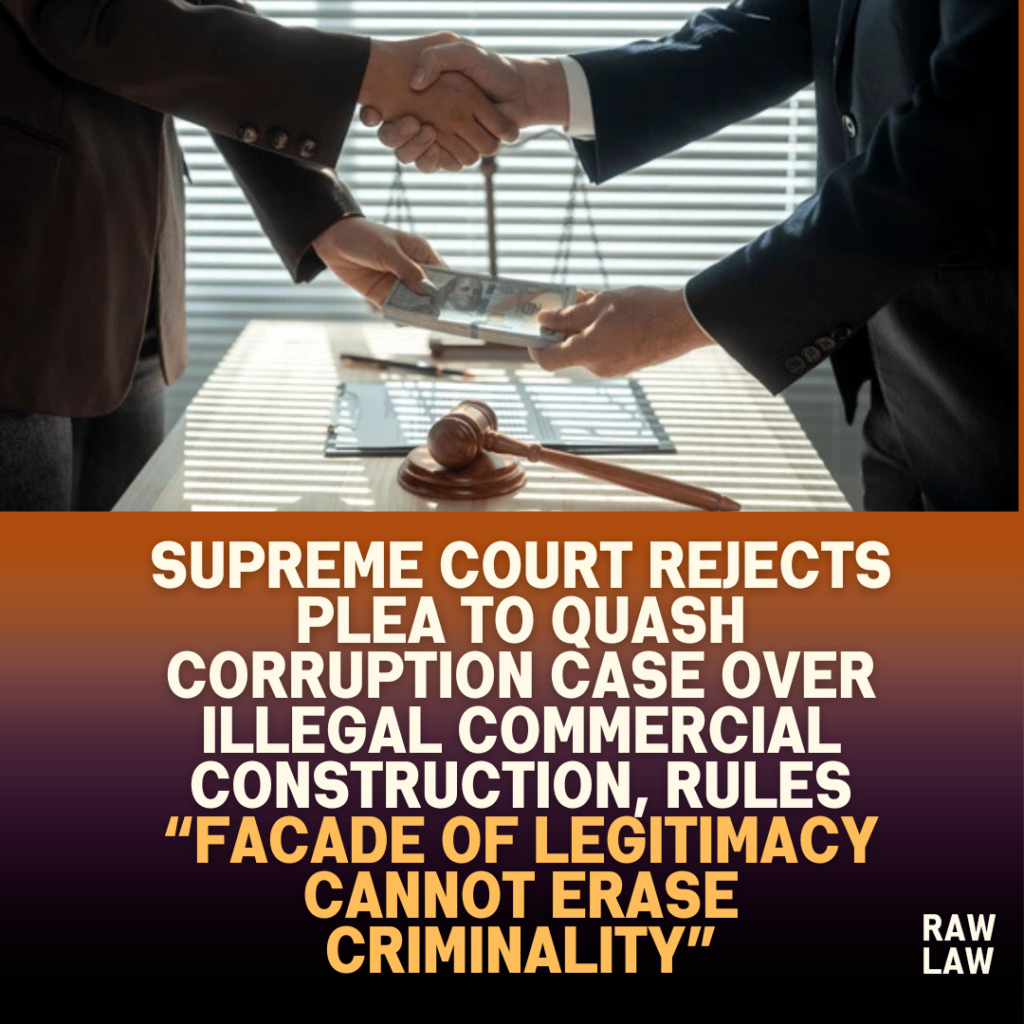Court’s Decision
The Supreme Court dismissed the criminal appeal challenging the High Court’s refusal to quash criminal proceedings against the appellant who was accused of illegally constructing a four-storeyed commercial building in violation of municipal building regulations. The Court observed, “From the very beginning, the appellant acted in conspiracy with the Municipal Corporation officials by giving a facade of legitimacy to his fraudulent actions.” It affirmed the High Court’s decision, concluding that the allegations and materials on record clearly established the necessary ingredients of the offences under the Prevention of Corruption Act and Indian Penal Code, warranting continuation of the prosecution. The Court further directed the authorities to initiate appropriate action against the illegal construction.
Facts
The case arose from the appellant’s alleged involvement in constructing a four-storeyed commercial building without proper permissions, in an area zoned as non-commercial in Thiruvananthapuram. The appellant owned a building and applied for a renovation permit under the Kerala Municipality Building Rules, 1999. The permit granted was limited to internal alterations and renovations. However, based on a complaint from a local businessman, a vigilance inquiry revealed that the appellant, in collusion with municipal officials and an architect, demolished the old building and constructed a new commercial structure, exploiting the renovation permit. Following the vigilance inquiry, an FIR was registered against the appellant, several municipal officials, and the architect for offences under Section 13(1)(d) read with Section 13(2) of the Prevention of Corruption Act and Section 120B IPC. The chargesheet confirmed a conspiracy to illegally construct in a prohibited zone.
Issues
- Whether the continuation of criminal proceedings against the appellant was justified despite his claim of subsequent regularisation of the construction.
- Whether the appellant was entitled to quashing of proceedings under Section 482 of the Criminal Procedure Code on parity with the co-accused architect whose prosecution was quashed.
Petitioner’s Arguments
The appellant argued that the chargesheet did not disclose ingredients of the alleged offences, particularly when the Municipal Corporation had agreed to compound the construction by imposing regularisation charges. It was contended that the original building collapsed due to natural causes and the appellant merely reconstructed it. The appellant also invoked parity, arguing that the proceedings against the architect (co-accused) were quashed, hence similar relief should be granted to him.
Respondent’s Arguments
The State contended that the appellant’s claim of natural collapse was a fabrication. The vigilance inquiry revealed blatant violation of building regulations through active connivance with officials. A stop memo was issued prohibiting further construction, which was wilfully disobeyed. Regularisation attempts were also fraudulent since construction of a commercial structure was impermissible in that zone. The State distinguished the architect’s case, asserting his professional role did not involve criminal conspiracy, unlike the appellant’s deliberate illegal actions.
Analysis of the Law
The Supreme Court meticulously examined the Kerala Municipality Building Rules, 1999, and concluded that no permit was necessary for internal alterations or renovations. The appellant’s act of obtaining renovation permission, knowing it was unnecessary, exposed the deliberate fraud to secure a facade of legality. The construction of a commercial building in a prohibited zone was not regularisable under law. The Court reiterated settled principles that the existence of prima facie material justifying charges precludes interference under Section 482 CrPC.
Precedent Analysis
The Court relied on settled legal positions that proceedings under Section 482 CrPC can be quashed only in rare circumstances where allegations even if taken at face value, do not make out any offence. Further, it applied the principle that regularisation does not wipe out criminality if the initial acts involve fraud and conspiracy. The Court also reiterated the principle that parity cannot be invoked where factual and legal positions differ between co-accused.
Court’s Reasoning
The Court reasoned that the appellant conspired with officials from the inception by obtaining unnecessary permissions to camouflage illegal construction. The fact that the appellant continued construction despite a stop memo, sought regularisation despite prohibition, and took shelter under parity with an architect uninvolved in the criminal conspiracy, highlighted deliberate abuse of process. It noted that framing of charges was already directed by the trial court, and non-challenge of proceedings by co-accused officials reinforced the prima facie case. The Court held that the High Court rightly refused to quash the proceedings.
Conclusion
The Supreme Court held that the appeal was devoid of merit and affirmed the High Court’s judgment refusing to quash the proceedings. The Court further directed that appropriate legal action be taken against the illegal construction. Pending applications were disposed of. The judgment reinforces that regularisation cannot be a shield against criminal liability when there is clear misuse of legal provisions through conspiracy and fraud.
Implications
This judgment clarifies that regularisation of illegal constructions does not erase criminal liability when fraud and conspiracy are involved. It also affirms the judiciary’s commitment to upholding zoning laws and punishing corruption in municipal administrations. The ruling establishes that parity cannot be claimed where circumstances are distinguishable, especially between public officials and private individuals with active involvement in criminal conspiracies.
FAQs
Q1. Does regularisation of illegal construction automatically absolve criminal liability?
No, the Supreme Court categorically held that regularisation does not wipe out the criminality of acts committed through fraud or conspiracy.
Q2. Can proceedings be quashed under Section 482 CrPC when charges are already framed?
No, the Court reiterated that once a prima facie case is made out and charges are framed, quashing proceedings is not justified unless allegations are inherently absurd or fail to make out any offence.
Q3. Is parity applicable if co-accused are discharged or proceedings against them are quashed?
No, parity cannot be claimed when factual circumstances are different, especially when co-accused (like an architect) had no role in the conspiracy while the main accused actively participated.



